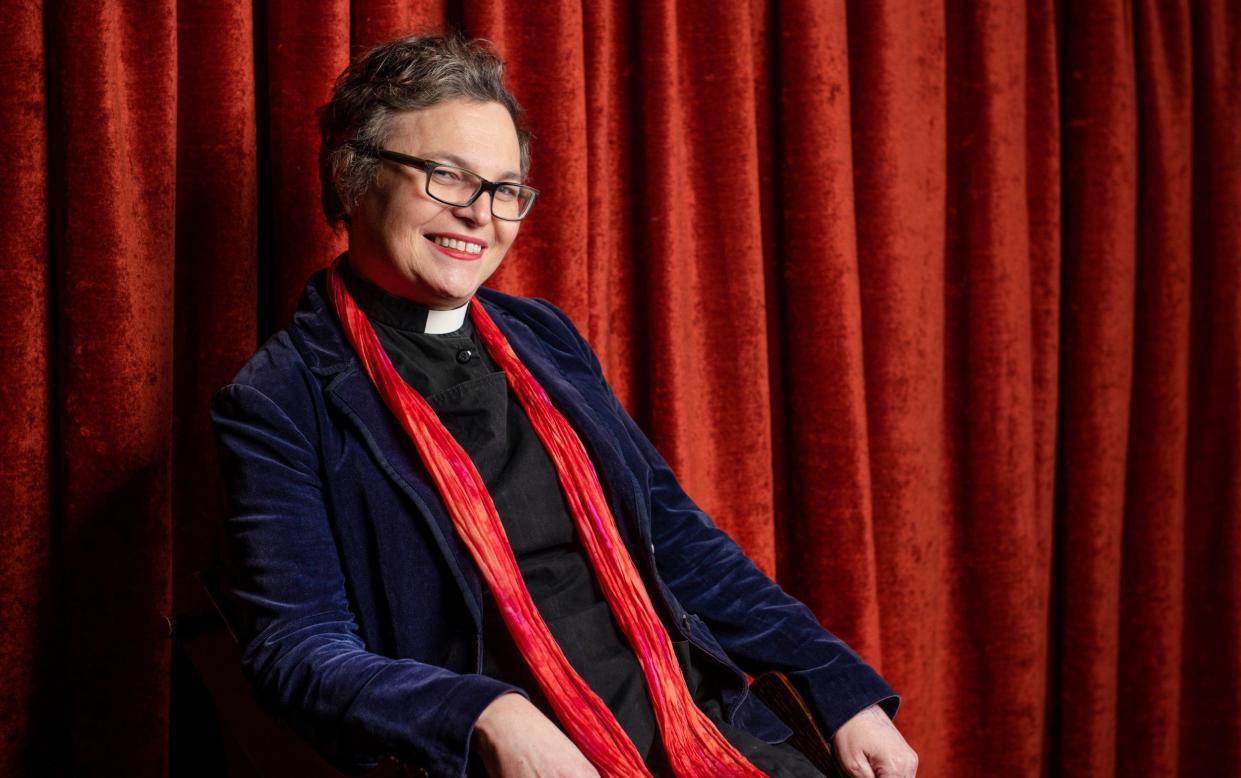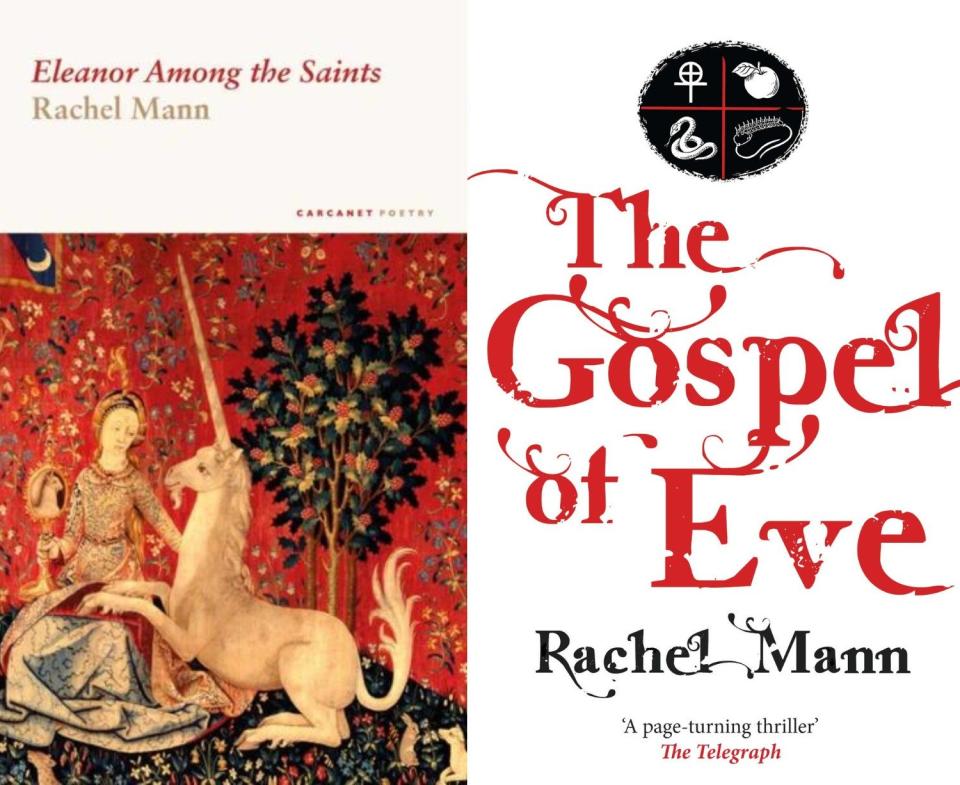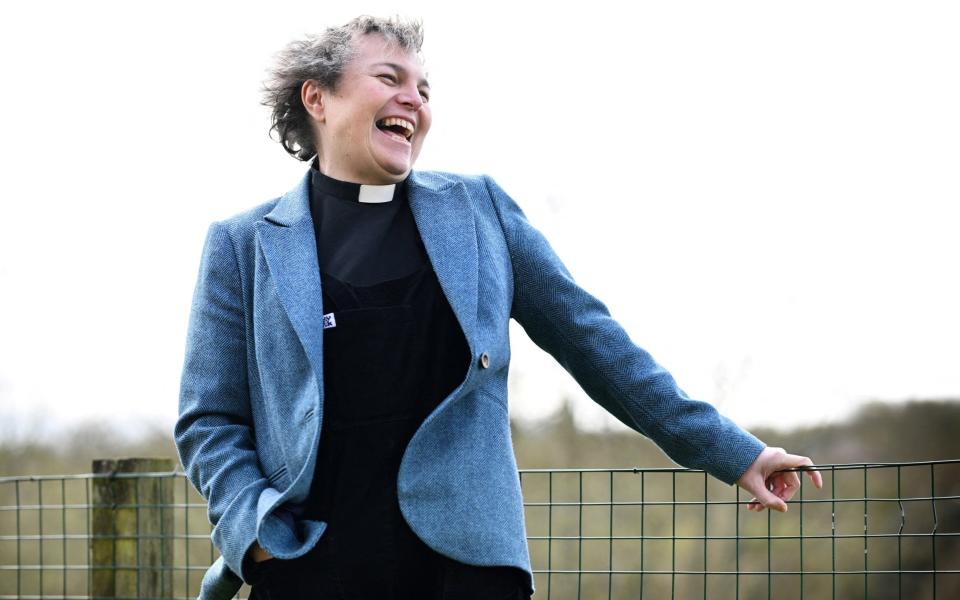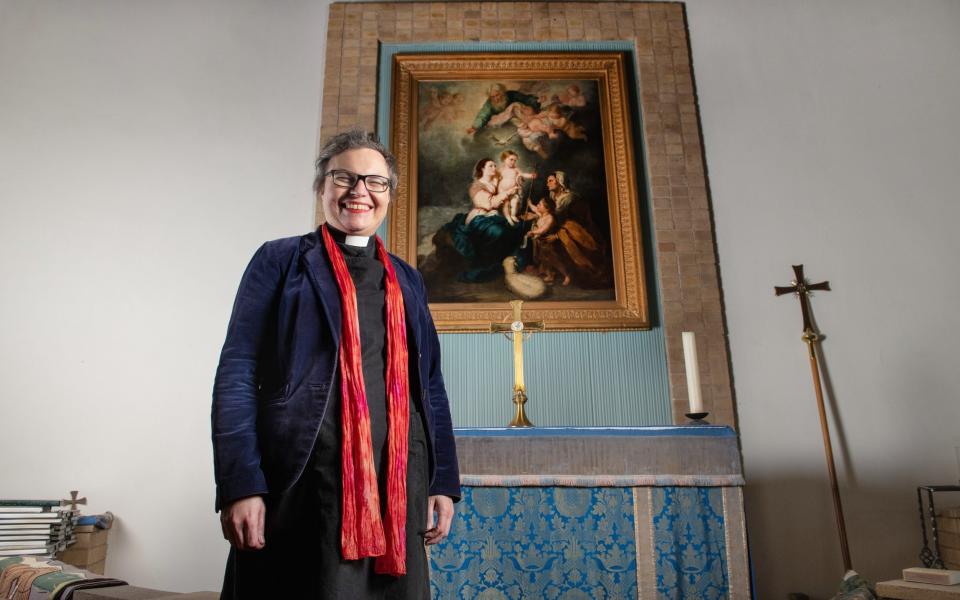Church of England’s first trans archdeacon: ‘I promised I’d not prioritise being a priest over love’

- Oops!Something went wrong.Please try again later.
- Oops!Something went wrong.Please try again later.
“Every woman who makes herself male will enter the kingdom of Heaven,” Jesus tells his disciples in the gnostic Gospel of Thomas. It’s a line that Rachel Mann quotes in her second poetry collection, Eleanor Among the Saints, before querying: “What, then, of the male who makes/ Of himself a woman?/ Premise: the penis does not yield to prayer./ Evidence: Lord knows, I tried”.
Although Mann winces at the idea of her questing, playful poetry being read as “merely confessional”, her story is woven into the text. Assigned male at birth in 1970, she began living as a woman in 1993. A former atheist – who stuck up a poster reading “F–K CHRISTIANS” on her wall while studying philosophy at university – she was surprised to find God on her journey between genders.
Born again in two senses, she underwent sex reassignment surgery in 2003 and was ordained into the Church of England in 2005, ministering in Salford and Bolton for 18 years before being appointed as the Church of England’s first transgender archdeacon last year. Over that time she has also produced 14 books of fiction, theology and poetry, gaining popularity as a religious broadcaster with her down-to-earth contributions to Radio 4’s Thought for the Day and Radio 2’s Pause for Thought.
Zooming cheerfully from her bright and modern book-lined office in Manchester, Mann tells me although her priestly goal is “to worship God like no one’s watching”, she believes that “minority visibility matters” when it comes to making everyone to feel included in her church. So despite getting “weekly emails denying my reality, telling me I’m going to hell,” she bravely continues to explore questions of faith and trans identity in her poetry.
Former Archbishop of Canterbury Rowan Williams is a fan, noting that: “All poetry has something to do with bodies being transformed – whether in violence and grief, or in hope, in embrace, in miracle,” and he praises the “exhilarating verbal energy and emotional subtlety” with which Mann addresses many forms of transition and transformation.

In her 2012 memoir, Dazzling Darkness, Mann is likeably direct about her history. She describes the pain of her early gender dysphoria, her struggle to maintain a socially acceptable “mask” of masculinity. As a man, she had married a woman and embarked on a career in academia, lecturing in philosophy. And she’s frank about the act of “violence” she committed on “perfectly normal, functioning male genitalia” during sex reassignment surgery in order to feel true reconciliation with her body and genuine “wholeness”.
She writes: “I do not think we should be afraid of the thought that there are circumstances in which reconciliation cannot avoid violence. There is a sense in which this idea lies near the heart of the Christian story. It is a kind of uncomfortable darkness. For Christ follows a path which does not turn away from violence; and that path leads to his destruction through violence. And it is only in death that Christ is raised to new life.”
Today Mann, who divorced her wife in the Nineties and is currently single, tells me that: “The idea for Eleanor Among the Saints came from a reading I did in London in 2016 with another trans poet. As trans elders, we were asked to what extent we felt we were making a contribution to a ‘trans archive’.” She tosses up both palms and admits she had never considered the question before, but went away wondering: “What archives are there? What is the history of trans identity? Then in 2018 I found myself in conversation with medievalist Dr Daisy Black who told me about ‘Queer Medieval Studies’ which have recovered fascinating figures like [14th-century Venetian trans sex worker, executed for sodomy] Rolandina Ronchaia and Eleanor ‘John’ Rykener…”
Eleanor Rykener, I learned from Mann’s book, was a 14th-century seamstress and sex worker who has been claimed by recent academics as an example of a trans person living in medieval England. The evidence we have of her existence comes from an interrogation by the Mayor of London following her arrest in Cheapside in late 1394 for having sex with a former chaplain. Under questioning, Eleanor described how she had sex for pleasure and for money with both priests and nuns, and how – having been born as a man called John – she had been taught to dress and act like a woman by other women.
“Was John/Eleanor Rykener trans in the modern sense? That feels like a stretch.” writes Mann. Yet she felt that Rykener’s “extraordinary resurrection” via trans studies “invites mythologising” and so the poems reincarnate her in many forms through history – inviting us to meet her at one point in the company of Saint Perpetua [an early church martyr who reputedly changed sex from female to male at the moment of her death in the Roman Arena] and later in the body of a “Sixteen Year Old Murdered Trans Girl”.
This girl is clearly based on Brianna Ghey, the trans schoolgirl from Warrington who was fatally stabbed by two other children at a park last February. Mann was anxious “not to transgress on real grief with a fabrication. I’m so conscious that Brianna was an actual, cherished, beloved human being and daughter.” It’s a poem which invites readers to see Ghey’s murder as a hate crime, as a type of human “killed multiple times”. But it’s also a deconstructed sonnet and Mann hopes her use of a form traditionally used to express love [for Brianna] means that there is “love embedded in it”.
Mann is often asked to read at corporate events marking the annual Transgender Day of Remembrance (TDOR) at which speakers normally read the names of trans people murdered over the course of the preceding year. Mann shakes her head, wearily. “I don’t mind admitting there are times when I have struggled to get through the list of names. You’ll often have around 350 names. When you think about what tiny a percent of an actual population are trans people, it’s terrifying and desperately sad.”
But Mann is also weary of being wheeled out by organisations “going through the motions”. In her new poem #TDOR she toys with the awkward language used by those inviting her to speak. “Will you, would you, would you please,” it begins, before assuring “it’s our privilege/ A way to show we care for your, our community,” and that they have “names from website, so many/ And we thought, what do you think, in batches of ten.”

“That’s a good example of a poem where I play with repetition,” Mann tells me. “I love stuttery repeated words or phrases because I’m interested in where language gets stuck. I hear this in conversations with friends who’ve experienced really bad sexual trauma. That can lead to a ‘stuckedness’. But we do all get stuck, often as we want to move on. There’s often risk, danger, a kind of violence that’s held in language at those times.”
Although in conversation – and in her memoir – Mann is chattily straightforward about her life and faith, she uses a whole chorus of voices in her poetry. After years of thinking she needed to find one true voice on the page, she’s found greater truths revealed by assuming different characters. Although she’s aware that her multiple reincarnations of Eleanor are “different versions of myself”. “I was an actor as a teenager and only came to poetry later,” she says, “so there’s an element of performance in my poems.”
She also suspects that “sincerity can kill poetry” which is why she believes that “so much religious verse fails as poetry. Because it is so committed to a particular ethical line. As a poet, I want to follow the language, to push at the edges. I want to test out what’s possible to say. I want to discover my love of form, structure, and wordplay. These inflections of joy, trauma, tragedy…”
Although, as a poet, Mann loves the fluidity of words, she admits that she sometimes feels like “a dinosaur” when it comes to modern queer linguistics. She’s been challenged for thinking about sex in more traditional binary terms. Although she notes that there may have been greater freedom for those who transitioned in the 1990s: “There weren’t role models, so there was a sense of inventiveness, you sort of got on with it and there was very little public attention. Now there is so much attention on trans people and so many narratives around transition, which can be helpful and unhelpful.”
I am Canon Rachel Mann. I am a priest, a writer and poet, and a broadcaster. I love Jesus. I am trans. I am tired of being seen as a culture war problem, but I am still full of hope for a peace where God’s glorious rejoicing in his world will be known. #TransDayOfVisibility pic.twitter.com/Muqvg8FxPf
— Dr Rachel Mann (@RevRachelMann) March 31, 2023
Visiting a local sixth form recently – a mixed group of Catholics, Methodists, Jehovah’s Witnesses, some conservative members of a local mosque – she was struck by “how these bright, capable kids all felt keen to tell me what I had to believe. They told me that to do my job I had to believe in six-day-creation, that I couldn’t believe that evolution is the best working hypothesis. They thought I should have very closed down views about sexuality and gender.” She smiles. “I came away reminded that at 16-17 I was probably as dogmatic as they were.”
I wonder if poetry also gives Mann a safe space to use the kind of language that might be less acceptable in church? “Not really,” she says, noting there are “different registers and permissions available in different kind of forms” although as we speak I do find it hard to imagine her using some of the coarser language that appears in her poetry. In-person she seems so thoroughly vicarish, with her gently amused exclamations of “Gosh!”, and her assertion that her idea of a hot date these days would be “taking the bank holiday off with a cup of tea and Pride & Prejudice on the telly.”
“You can probably tell that I’m a secret romantic,” she tells me and I nod. I bet she does a great wedding. “Oh, I LOVE a good wedding,” she swoons. “What greater joy is there than to witness two people saying they love each other in the sight of God? Watching the commitment to that lifelong faithfulness is always beautiful, extraordinary.”

But, as a gay woman, she would not be allowed to keep her job in the Church of England if she wanted to get married herself? She shakes her head. Then tells me that “I made an agreement with myself a few years ago that I would not prioritise my career over matters of the heart. So should I meet the right person, should we want to get married… Hmm. Then I wouldn’t say: we can’t possibly get married because I’m ordained.” She pauses. “I adore being a priest. It’s at the heart of my being. But love’s really rare, actually, so…” She says she’d be overjoyed “to be able to officiate at weddings for same-sex couples. But I don’t think that’s going to happen in my lifetime. That’s part of the deal. I know what the lines are and I walk within them.”
Her church’s refusal to validate the same-sex love Mann would like reminds me of the passage in her memoir where her friends tell her that a gay trans woman wanting to work in the culturally conservative Church of England seems like “a Jew wanting to join the Nazi party.”
But Mann has made peace with the contradictions. “I guess religious people – especially people like me who exercise some religious authority – are often accused of being a bunch of hypocrites. They think we say one thing in public and another in private. But if someone says to me: ‘Vicar, you’re a hypocrite, I’m never coming to church’. My response is; ‘Yes, I am a hypocrite and there’s always room for one more’.”
“Yes, the Church of England can be slow to move,” she says, “yet sometimes it’s incredibly radical.” They appointed Mann, after all. “So the Church remains for me the very best place for me to be who I am, with all my oddness and quirks,” she smiles. “It’s full of strange, quirky people. I cherish that.” And what of the people who tell Mann she doesn’t belong in their church? “Nobody likes to have mud slung at them,” she shrugs. “But I try to remember that those people who want to have a jab at me still remain beloved children of God. I want to leave open that state of grace for them, because that’s what I rely on myself.”
Eleanor Among the Saints is published on January 25 (Carcanet)

